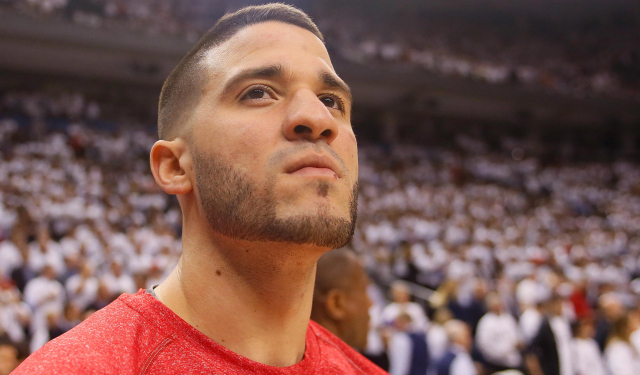It all began when the Raptors, in an attempt to throw the season away, acquired three expiring contracts in the form of Patrick Patterson, John Salmons and Greivis Vasquez as part of the Rudy Gay trade. The plan was to tank and if it weren’t for these three seeming nobodies, the entire outlook of this franchise may have been different. Not sure if better or worse, but definitely different.
Of the three, Greivis Vasquez was the piece that, even at the time of the trade, you might have thought had a real future with the club. Lacking a second point guard, he was a proven commodity that could secure the reserve guard position, and offered a different blend of offense than Kyle Lowry. His history of leading the league in assists (no small feat), and superior size at the position indicated that he was capable of generating offense, while also running the team responsibly. The tandem of Lowry and Vasquez reminded one of the T.J Ford/Jose Calderon duo, who in 2007-08 were one of the most potent 1-2 punches at the position (only to be destroyed by Jameer Nelson in the playoffs).
As streaky, frustrating, and thrilling as his offense has been the last season and a half, it wasn’t that which led to Vasquez being shipped away. Lack of offensive efficiency isn’t something that gets you in Dwane Casey’s doghouse, not when you have DeMar DeRozan and Lou Williams gobbling up minutes. His pull-up threes in transition and long-twos after a quick screen early in the clock didn’t kill the Raptors, because he had the sense to reduce the volume of his shots when they weren’t going in. There’s something to be said for self-awareness, and nobody can say that Vasquez dominated the ball and reduced the overall efficiency of the offense.
On offense, when he was good, he was really good. When he was bad, he was moderately bad and knew when to stop.
It didn’t help him that the Raptors didn’t play a lot of pick ‘n roll, despite having two guys in Amir Johnson and Jonas Valanciunas who are capable roll men. Running the pick ‘n roll while seeing over the defense on account of his size is what Vasquez’s strength as a point guard is, and when that wasn’t available to him, he looked to generate his offense through means which often seemed inefficient. The isolation-heavy Raptors offense essentially froze out Vasquez’s skill-set and forced him to be a spot-up shooter, which he’s not great at since his shot requires time to release.
It’s not a surprise that during his first half-season his assist rate was 29.5%, which is excellent, and in his second season it dipped to 23.9%. That’s not because Vasquez suddenly forgot how to pass, it’s because the Raptors offense went away from team-oriented basketball to feeding Kyle Lowry and DeMar DeRozan possession after possession. When he did play with the subs, he played with Lou Williams – a ball-dominant high-usage player that forces the other four players on the court to watch him. That is not a situation where a PG can be successful.
Vasquez’s issue was his defense, he remains a horribly immobile defender that simply can’t defend 95% of players at either guard position. The only time he’s able to check someone with a half-measure of success is when it’s a slower player who he’s able to body up using his frame. The problem is that there aren’t many slower guys than him in the league.
He wasn’t entirely at fault for his defense as his coach did him no favours. Dwane Casey’s reluctance to consistently make offense/defense subs meant that Vasquez found himself in unfavourable positions in critical stretches of play, often being on the court and guarding a guy that he had no business being near of. Checking Tyreke Evans up top with the game on the line is probably the most blatant example that comes to mind. These situations enflamed fans and painted him in a much harsher light than he deserved.
The Raptors defense bleeds points because key players like DeRozan, Lowry, and Jonas Valanciunas are highly questionable defenders, and play in a scheme ill-suited for their defensive abilities under a coach that can talk defense but hasn’t shown that he can walk it. Having Vasquez as part of the setup compounds the coaching and personnel issues, and if you go by the theory that you’re only as strong as your weakest link, the Raptors certainly have strengthened their weakest link, except the chain remains fragile.
The acquisition of Delon Wright adds up because Masai Ujiri loves big defensive PGs, evidenced by him giving Julyan Stone a chance twice. If Wright is indeed the official backup PG next season, and there’s no reason he can’t be given how many minutes Lowry plays, the defense will improve simply because the point-of-attack was strengthened. The move does leave the bench threadbare for offense, and I don’t believe Lou Williams will return, so it does present Masai Ujiri additional work to do because as of this moment, the best offensive bench player is Patrick Patterson, a guy who can’t create for others and needs his shot created for him most of the time. That’s assuming Amir Johnson returns in the same capacity, and if not, then Patterson would start and the honor would go to James Johnson. Yikes.
From a purely basketball point-of-view, I’m a bit sad to see Vasquez go because I did feel he could have contributed more in an organized setup. At the same time, the move improves the Raptors defensively, gives them even more cap room to work with. The assets checkbox has been ticked, so has the cap room one. The question now becomes what does Ujiri does with that room? Fix the barren bench? Wait for next summer when there are more free-agents available? Make trades where you’re taking expensive players into space? Exciting times, and plenty of possibilities.



